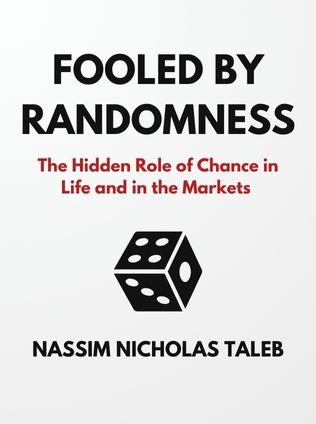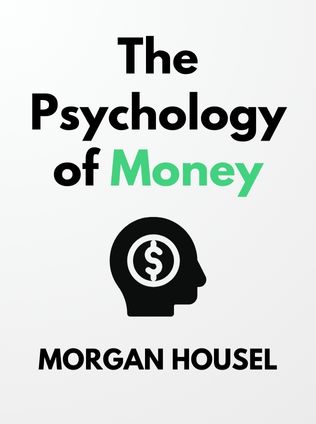
Fooled By Randomness
The Hidden Role of Chance in Life and in the Markets (Incerto)
By Nassim Nicholas Taleb
Published 01/2001
About the Author: Nassim Nicholas Taleb
Nassim Nicholas Taleb is a scholar, essayist, and former financial trader whose work focuses on issues of randomness, probability, and uncertainty. With a PhD in Management Science from the University of Paris-Dauphine and a varied career that spans the financial industry and academia, Taleb brings a unique perspective to his writing. His background as a trader in the complex and often unpredictable world of finance informed much of his work, providing him with firsthand experience of the randomness he explores in his books. Beyond "Fooled by Randomness," Taleb is best known for "The Black Swan," which examines the impact of rare and unpredictable events, and "Antifragile," where he introduces the concept of systems that benefit from disorder.
Taleb’s work is characterized by its cross-disciplinary approach, drawing from fields as diverse as mathematics, philosophy, finance, and literature. His writing style is provocative, often challenging conventional wisdom and inviting readers to question their assumptions about the world. Taleb has been both lauded and criticized for his bold ideas, but his influence on contemporary thinking about risk and uncertainty is undeniable.
Main Idea of "Fooled by Randomness"
"Fooled by Randomness" delves into the significant yet often overlooked role that randomness plays in life, particularly in the context of financial markets. Taleb argues that much of what we perceive as success is not the result of skill, hard work, or foresight but rather the outcome of random events and luck. This insight challenges the commonly held belief that we can predict and control outcomes in complex systems.
Taleb's core argument is that human beings are wired to see patterns, even where none exist, and this tendency leads us to attribute success to personal qualities like intelligence or perseverance when, in reality, randomness often plays a much larger role. He explores how this misunderstanding can lead to overconfidence and poor decision-making, particularly in professions like finance where luck and randomness are deeply embedded in the fabric of the industry.
Table of Contents
- Introduction: Solon’s Warning
- If You’re So Rich, Why Aren’t You So Smart?
- A Bizarre Accounting Method
- Randomness, Nonsense, and the Science of Mind
- Survivorship Bias
- Skewness and Asymmetry
- The Problem of Induction
- Luck in the Face of Determinism
- Loser Takes All: On the Nonlinearities of Life
- The Epistemology of Luck
- Randomness in Real Life
- Conclusion: Living with Randomness
Introduction: Solon’s Warning
The book opens with a reflection on Solon’s warning, which cautions against assuming that success and wealth are solely the results of one's actions. Solon, an ancient Athenian statesman, warned that no man should be considered happy until his death, as fortune can change at any moment. Taleb uses this ancient wisdom to set the stage for his exploration of randomness, highlighting the inherent unpredictability in life and the folly of assuming control over one’s destiny.
Taleb argues that modern society is often "fooled by randomness," believing that the successful are deserving of their success and the unsuccessful of their failures, without adequately accounting for the role of luck. This opening chapter invites readers to consider how much of their own lives—and the lives of others—are shaped by forces beyond their control.
If You’re So Rich, Why Aren’t You So Smart?
In this chapter, Taleb questions the assumption that wealth is a direct indicator of intelligence or skill. He presents the idea that in fields driven by randomness, such as financial markets, success is often more a matter of luck than skill. The title of the chapter itself is a provocative challenge to the notion that the rich are inherently smarter or more capable than others.
"The fortunate in life rarely attribute their success to random events, preferring instead to highlight their own skills and hard work." – Nassim Nicholas Taleb
Taleb introduces the concept of "survivorship bias," a cognitive bias that leads people to focus on the successful cases while ignoring the countless failures. This bias skews our perception of reality, making it seem as though successful people have a formula for success when, in reality, they may have simply been lucky. For example, we often admire successful entrepreneurs and investors, believing that if we mimic their strategies, we too will achieve success. However, we fail to consider the many others who employed the same strategies and failed due to factors beyond their control.
Sign up for FREE and get access to 1,400+ books summaries.
You May Also Like
Rich Dad Poor Dad
What the Rich Teach Their Kids About Money - That the Poor and Middle Class Do Not!
By Robert T. KiyosakiFreakonomics
A Rogue Economist Explores the Hidden Side of Everything
By Steven D. Levitt and Stephen J. DubnerThe Lean Startup
How Today's Entrepreneurs Use Continuous Innovation to Create Radically Successful Businesses
By Eric RiesWho Moved My Cheese?
An Amazing Way to Deal with Change in Your Work and in Your Life
By Spencer Johnson, M.D.Factfulness
Ten Reasons We're Wrong About the World – and Why Things Are Better Than You Think
By Hans RoslingMake Your Bed
Little Things That Can Change Your Life...And Maybe the World
By William H. McRaven



















